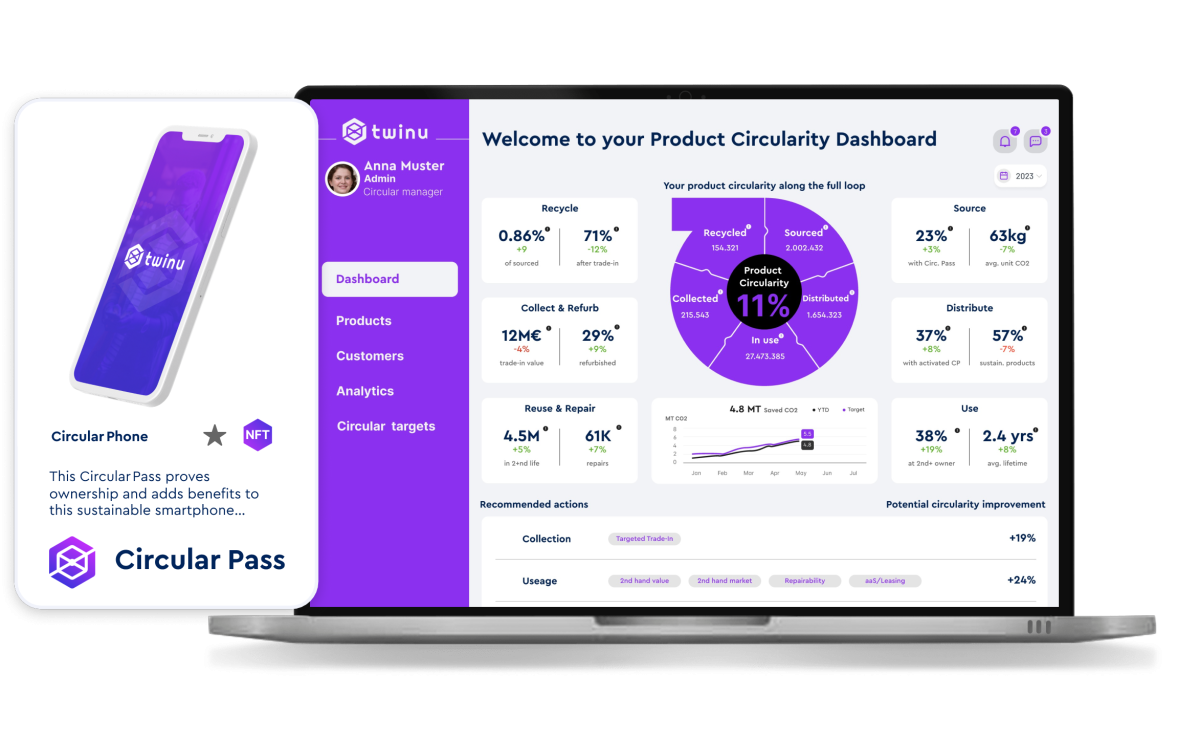Munich Startup: What does Twinu do? What problem do you solve?
Christian Adler, Twinu: We help manufacturers and brands of physical products to successfully manage the transformation from a linear to a circular economy. With our software solution, companies can measure and specifically improve the circularity of their products. This means how long and well they can keep their products in the cycle (even over several users) before they are finally collected and recycled. The longer a product is used by more people, the better it is for the environment. This also includes transparency about important product materials and properties so that products can be used, repaired and recycled more sustainably. More and more companies have recognised this and are looking for corresponding digital solutions. In addition, there is an EU regulation from the ‘Green Deal’ that is intended to promote precisely these improvements: the Digital Product Passport. It will become mandatory for almost every type of product over the next few years.
Munich Startup: But that’s nothing out of the box!
Christian Adler, Twinu: Unfortunately it is, otherwise our world would already be more circular and we would not receive so many requests for talks from companies desperately seeking solutions for the circular economy. The transformation to a circular economy is probably the biggest transformation our economy has ever gone through. For millennia and until today, we humans have operated in a “linear” way, mining for natural resources, producing products, using them (usually for too short a time) and disposing of them at the end (usually burning them or dumping them in heaps). This must change if we want to protect our climate. Because about half of the CO2 comes from the production and consumption of physical products.
Positive impact of the digital twins
Munich Startup: What is your founding story?
Christian Adler, Twinu: We are three founders and digital experts who have known each other for many years, partly from jobs in consultancy and partly from university (CDTM). Based on our professional experience, we decided to extend the use of digital twins to applications beyond development and production in companies. For this purpose, we developed a unique technology and filed a patent, and in parallel tested the numerous possible use cases with customers and companies. It quickly became clear that our digital twins have their greatest “impact” for people, the environment, companies and also our startup in the circular economy.
Munich Startup: What have been your biggest challenges so far?
Christian Adler, Twinu: Our technology and solution is based primarily on digital twins and AI and can be used very flexibly. It can be used to solve many problems in many industries. As a startup, however, you have to quickly focus on your niche with the greatest impact. That always sounds easier in theory than it is in practice, when you continue to receive requests for other problem areas from various industries and you also have to say “no” sometimes. But we have succeeded and have clearly defined and focused our “circularity sweet spot”.
Munich Startup: Where would you like to be in one year, where in five years?
Christian Adler, Twinu: In one year, we will have successfully rolled out our current projects in our focus sectors, mainly electronics products, furniture and textiles. In addition, we will have completed the certification we started regarding our own social and environmental impacts. In five years, we see ourselves as the leading provider of Digital Product Passports and Digital Product Twins, which make physical products not only more sustainable, but also functionally better.
Good mix of science, business, and startup ecosystem
Munich Startup: How have you experienced Munich as a startup location so far?
Christian Adler, Twinu: With its universities, the CDTM, UnternehmerTUM and many other institutions and strong companies, Munich offers a very good mix of science, business and the startup ecosystem. More and more is also happening in Munich with regard to our core topic of “Circularity“, for example in the context of the Circular Republic. As a startup, we also receive a lot of support from the City of Munich in the form of the numerous startup offers, but also through the city’s Net Zero goal for 2035, which underlines the necessity of our solution for the circularity of products as well as many other projects in the Munich area.
Munich Startup: Risk or security?
Christian Adler, Twinu: Definitely risk! You can’t have a startup without risk. Otherwise it’s not a startup and you don’t really create anything new. Or to use the words of a former American racing driver: “If you are not scared, then you are not driving fast enough.”

